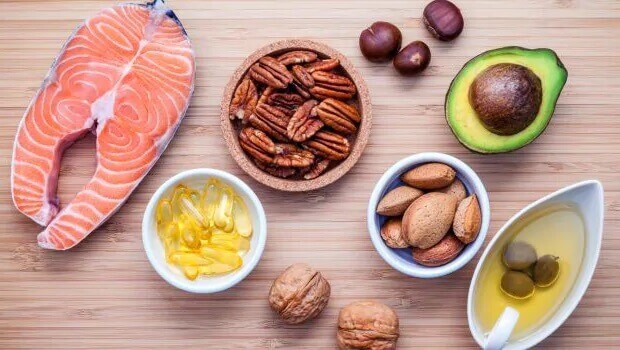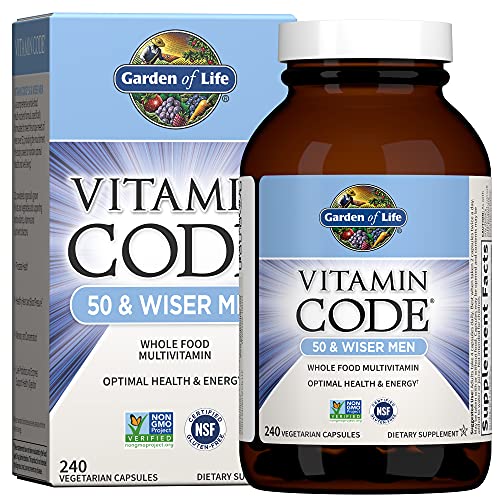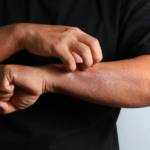One of the best ways to manage eczema or psoriasis is to ensure you are getting the recommended vitamins. What are the best vitamins for eczema and psoriasis?
The 7 best vitamins for eczema and psoriasis are:
- Vitamin A
- Vitamin B3
- Vitamin B5
- Vitamin C
- Vitamin D
- Vitamin E
- Vitamin K
These vitamins will do more than just give you more energy in your step. They are vital for ensuring you keep skin conditions such as eczema and psoriasis under control for life.
Read on to learn more about the best vitamins for eczema and psoriasis and tips for managing these skin issues.
Also, for an excellent vitamin for dry skin, take a look at our top pick, the Garden of Life Vitamin Code. Garden of Life includes the best ingredients along with live probiotics, enzymes, and antioxidants for greater absorption.
Click here to see it on Amazon.
Click here to see it on Amazon.
Best Vitamins for Eczema and Psoriasis – Our Top 7 Picks
1. Vitamin A
Vitamin A is one of the best vitamins to get for healing and preventing eczema and psoriasis. It penetrates deep within the skin, where it helps promote collagen production, reducing the appearance of wrinkles and fine lines.
It unclogs pores, which reduces inflammation and increases the exfoliation of skin cells. It evens out the skin tone, hydrates it, and improves its appearance from sun damage and pigmentation.
There are two types of vitamin A. Preformed vitamin A, which is also known as retinol, is found in many different animal products. Good sources include meat, eggs, milk, cream, cheese, liver, halibut fish oil, and offals.
Another type of vitamin A, pro-vitamin A, is found in many plant-based foods, mostly fruits, and vegetables. The most common type of pro-vitamin A is beta-carotene.
Beta-carotene is a carotenoid that adds dark pigments to plant foods. Examples include cantaloupe, apricots, carrots, pumpkin, dark leafy vegetables, broccoli, and pink grapefruit.
2. Vitamin B3

Vitamin B3 is also known as niacinamide. It is made and used by your body to turns carbs, fats and proteins into energy. It helps support mind and stomach-related capacities, enhance joint inflammation, in addition to many other disorders. Vitamin B3 is one of the eight B-complex nutrients.
The body can also produce niacin (vitamin B3) from amino acids. Additionally, niacin comes in several forms, including niacinamide, which is known to have many skincare benefits.
In its niacinamide form, the vitamin works to prevent water loss and retain skin moisture content. It’s also known to boost levels of keratin. When it comes to aging skin, niacinamide is beneficial for the surface structure, helping to smooth out the skin’s texture and reduce the look of fine lines.
3. Vitamin B5
Vitamin B5 is an effective hydrator for your skin. It is otherwise called a humectant, which balances out the functions of your skin’s barrier. This adjustment results in an expansion in the amount of hydration in your skin.
You may discover B5 listed as d-panthenol, dl-panthenol, or dexpanthenol on various skin products. Use an item like a vitamin B5 serum to bring more water into your skin, particularly in the event that you experience the ill effects of dry or rough skin.
This is one of the best vitamins for eczema and psoriasis – preventing your skin from flaring up.
It works as an anti-aging product. Since vitamin B5 is known to soften and hydrate the skin, many different organizations use the vitamin in their anti-aging products.
It helps promote new skin cells. What’s more, it plumps and saturates the top layer of your skin, which makes it look more full and more youthful.
It helps with chronic conditions. Maybe most important is that vitamin B5 is known to help with some chronic skin conditions. Prescriptions containing the vitamin are used to treat everything from minor skin issues to significant, debilitating diseases like chronic eczema and psoriasis.
Many natural skin products containing the vitamin are additionally known to have anti-inflammatory and calming benefits for skin conditions, for example, dermatitis.
Did you know that a lack of vitamin B5 in your body can cause a wide array of health issues for you? People who are deficient in vitamin B5 may feel tired, weak and can experience dried-out skin. You need about 5 mg of vitamin B5 per day to ensure you are benefiting from it.
4. Vitamin C
Scientists have uncovered a brand new function played by vitamin C in helping with skin issues like psoriasis, eczema, and rosacea. Even though vitamin C was discovered decades ago, its benefits are still not fully known among scientists.
Vitamin C is known to counter the damaging effects of free radicals in the environment. Vitamin C also helps to heal broken or cracked skin by protecting the skin cells from DNA damage.
Vitamin C is also one of the many important nutrients required to prevent itchy skin. If you are deficient in nutrients, this leads to many skin problems, including itchy skin.
This new evidence suggests that, in addition to destroying free radicals, vitamin C helps to remove the damage these free radicals form if they get past a cell’s defenses. These findings are believed to be of great importance to the cosmetics industry.
There’s much debate in scientific communities about the properties and value of vitamin C, not to mention much controversy over whether or not such ingredients can have an actual impact on your skin or not.
In this study, ascorbic acid 2-phosphate (AA2P), which is a vitamin C derivative, was found to boost wound healing and also helps to protect from cell damage caused by oxidation.
Oxidation, caused by free radicals, is directly linked to premature aging of your skin cells. Antioxidants, like vitamin C, may help protect against this kind of damage, which bodes very well for natural cosmetics and anti-aging products.
So definitely get more vitamin C for eczema and psoriasis. See the below video to learn more vitamins and tips that will help heal eczema and psoriasis:
5. Vitamin D
Many studies have shown that vitamin D is a highly effective treatment for skin issues like psoriasis and eczema. In children, the benefit of vitamin D is sometimes seen a lot earlier than in adults. It’s found that even just 25 mcg/day (1,000 IU) improves eczema within only about 30 days.
Vitamin D dramatically improves the severity of diseases like atopic dermatitis. It’s also been found that 1600 IU of vitamin D helps eczema and psoriasis, but it works even better when combined with about 600 IU of vitamin E.
If you have eczema or psoriasis, I highly recommend you try a vitamin D supplement, but you must take the right amount. Take between 125 to 375 mcg/day (5,000 to 15,000 IU) as a good start.
It’s also a good idea to have a vitamin D blood test before you start taking it and also in about two months after taking it.
Most people will have adequate vitamin D levels with the above amount, but some will need more, especially for those who weigh more. Remember that if you stop taking vitamin D, your eczema or psoriasis can flare up temporarily as it adjusts.
6. Vitamin E
Vitamin E is an essential, fat-soluble vitamin with anti-inflammatory properties, perfect for many skin diseases. It helps support the immune system, which is directly linked to the health of your skin.
It’s an antioxidant, making it highly effective at stopping the damage from free radicals caused by toxins in the environment.
This is critical for ensuring your skin remains plump, hydrated, and healthy as you age. To learn more about how vitamin E and other vitamins help prevent dry, aging skin, see my post: What Vitamins Will Help With Dry Skin?
Vitamin E may also be effective at reducing UV damage to the skin. UVA and UVB can greatly damage your skin, causing it to age prematurely. Vitamin E helps support the skin’s function as a barrier against these UV rays.
Vitamin E is also used to widen blood vessels, which helps reduce the risk of blood clots. Constricted blood vessels could be a cause of atopic dermatitis and other skin issues, so vitamin E would be beneficial if you suffer from these.
Note that vitamin E levels also decrease with age. However, if you take it on a regular basis, whether as a supplement or as an ingredient in topical products, you will continue benefiting from it.
7. Vitamin K
Doctors and scientists have long discovered that aging skin, including fine lines, wrinkles, and dark spots, is caused by environmental factors, not just the natural process of aging. This means that if you’re still young, your skin can still age rapidly if you are exposed to toxic elements and environments. Vitamin K helps to defend against this.
If your skin has reduced collagen and elastin, it will develop fine lines, wrinkles, and other signs of aging. Both collagen and elastin are vital to maintaining the elasticity of the skin and its ability to stretch and function properly.
When you have a low amount of important collagen and elastin, your skin will age faster as it develops more wrinkles and lines. Low collagen and elastic also lead to more chronic skin conditions such as eczema and psoriasis.
This is where vitamin K helps; it helps protect the collagen in your body. When healthy collagen production is maintained, your skin appears more hydrated, smooth, and younger-looking. This means that your skin will be able to stay elastic and, therefore, will avoid developing those aging lines.
One Japanese study highlighted the anti-aging benefits of vitamin K. Scientists found that women who regularly consume seaweed, which is packed with vitamin K, compared with caucasian women of the same age who did not eat seaweed.
The Japanese women, over time, had far higher levels of collagen and elastin in their skin which results in fewer wrinkles.
Another beneficial vitamin that many are deficient in, and so require a supplement is vitamin B12. See the video below for more on vitamin B12 and how it can help heal your skin:
Conclusion – Best Vitamins for Eczema and Psoriasis
So what are the best vitamins for healing eczema, psoriasis, and other skin inflammation?
The 7 best vitamins for eczema and psoriasis are:
- Vitamin A
- Vitamin B3
- Vitamin B5
- Vitamin C
- Vitamin D
- Vitamin E
- Vitamin K
It is best to get a blood test done to see which vitamins you are low on, if any. Your doctor can tell you the foods you need to eat and may suggest supplementing.
To get your bases covered and ensure you get all the right vitamins and minerals for skin health, you can take a good quality multivitamin.
For an excellent multivitamin for managing eczema or psoriasis, take a look at our top pick, the Garden of Life Vitamin Code. Garden of Life includes the best ingredients along with live probiotics, enzymes, and antioxidants for greater absorption.
Click here to see The Garden of Life Women’s Multi on Amazon.
Click here to see the Garden of Life Men’s Multi on Amazon.
The Garden of Eden brand multivitamin is derived from natural plant foods and includes probiotics and enzymes to help with digestion. Remember to take multivitamins with food as they get absorbed more efficiently. If you take on an empty stomach, you can get nauseous.
Take one of these multivitamins a day to help keep your skin from flaring up and worsening eczema or psoriasis.
Related Questions
Can collagen supplements help eczema and psoriasis? Collagen is a major player in the process of preventing and healing eczema. If you are struggling with a bout of inflamed eczema or irritating psoriasis, consider a collagen supplement to help overcome these diseases.
What foods trigger eczema and psoriasis? Avoid foods such as processed meats, for example, hot dogs and bacon. Also, avoid dairy products as they contain natural inflammatory acid.
Bad fats such as trans fats can intensify eczema and psoriasis side effects since they can be changed over into inflammatory elements in your body. These foods give zero benefits and lack helpful vitamins needed for your skin health.
How can I boost my immune system to fight eczema and psoriasis? Get essential vitamins by adding more dark leafy greens into your diet, including kale and spinach.
Also include turmeric, which contains curcumin, a healing substance that is anti-inflammatory. Get rid of harmful chemical soaps and switch to natural or sensitive skin products only. Ensure that they’re not alcohol-based as well.
Related reading:
Calamine Lotion for Eczema – Is it a Good Treatment?
Noxzema for Eczema [Is Noxzema Good or Bad for Eczema?]











![Read more about the article Noxzema for Eczema [Is Noxzema Good or Bad for Eczema?]](https://skincaregeeks.com/wp-content/uploads/2020/12/noxzema-for-eczema-300x200.jpg)